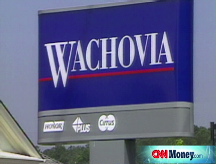Private equity bank rescue may be too late
Looser restrictions may coax buyout firms to invest in capital-hungry banks, but experts warn it isn't a fix for the industry crisis.
NEW YORK (CNNMoney.com) -- The Federal Reserve may have pulled off one "shotgun" marriage earlier this year by partnering up Bear Stearns with JPMorgan Chase.
But it remains doubtful if Fed chairman Ben Bernanke can pull off yet another so soon.
The Fed announced Monday that it was loosening long-standing restrictions on just how much of a bank both buyout firms and outside investors can own in the hopes of attracting private equity to invest in capital-hungry banks.
Previously, non-banking entities were restricted from owning more than a 25% equity stake in a bank or thrift. Now private equity firms can control as much as a third and are also allowed a greater presence in the boardroom.
Up until the latest turn in the credit crunch, the Fed had resisted the idea of allowing outside investors to exert control over a bank.
But with Congress haggling over a $700 billion bank bailout proposal, experts say tapping the buyout industry makes a lot of sense. Banks need capital and private equity firms have plenty of cash.
All told, the global buyout industry has accumulated about $400 billion in capital just waiting to be invested, according to the London-based research house Preqin.
Jaret Seiberg, a financial services analyst at the Stanford Group in Washington, was one expert who speculated that the move would not be the life preserver needed to keep the banking industry afloat.
"These changes as helpful, but they do not open the floodgates to private equity investments as some investors had hoped," Seiberg wrote in a recent research note. "While this could mitigate the current crisis, we see it as unlikely."
Certainly, Monday's move by the Fed will further whet the appetites of buyout funds such as Fortress Investment Group (FIG), which has expressed interest in acquiring an equity stake in distressed banks and thrifts.
But based on how poorly private equity investments in the U.S. banking industry have fared so far this year, buyout funds may be a little reticent about diving in head first.
Private equity giant TPG, for example, ponied up $7 billion in late April to acquire a stake in embattled savings and loan Washington Mutual (WM, Fortune 500), only to see that investment nearly wiped out by WaMu's deteriorating stock price.
"[Private equity firms] will certainly look at deals cautiously given what has happened," said Steven Kaplan, a professor of finance at the University of Chicago's Graduate School of Business.
At the same time, the buyout industry is likely to wait out current deliberations between Congress and top banking regulators to see if a bailout plan does indeed crystallize and what shape it takes, before taking any action.
A bank struggling under the weight of deteriorating residential construction loans, but with a sizeable deposit franchise, may become a lot more attractive if those toxic assets were not in the picture.
"I think they are going to have to wait and see what comes out of Washington," said Kaplan. "It would not be smart to make any decision before knowing what comes out of it."
If the Fed's plan works, private equity firms, in all likelihood, will invest in small and medium-sized banks, notes Jackson Turner, an equity research analyst with Argus Research in New York, who tracks Blackstone Group (BX) and Fortress.
Quite simply, there are plenty of distressed opportunities out there, notes Turner, and buyout funds don't necessarily want to wager on one large bank that could take a big hit in the coming quarters.
"Private equity wants to keep plenty of dry powder to do bread-and-butter buyouts that may be coming down the road," said Turner.
What's more, taking a stake in a big bank may not necessarily be feasible anymore given the volatility in the financial markets. Turner said buyout funds can no longer rely on debt to finance the types of whopping deals they did just a few years ago.
"With the credit markets shut down, it has encouraged private equity funds to keep transactions fairly small," Turner said. "That's why it's going to really be a story for small regional banks rather than a WaMu." ![]()


